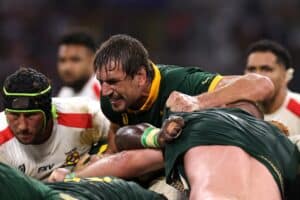Where things become a bit tricky is Ramaphosa spending much time balancing party national conference resolutions with government policy.

In his book, The Hardest Job in the World: The American Presidency, New York Times best-selling author John Dickerson examines the leadership styles of those occupying the highest office in the United States.
Delving into the past and present, Dickerson – correspondent for 60 Minutes and CBS News senior political analyst – takes a look at the American presidency of George Washington, Abraham Lincoln, Franklin D Roosevelt, Dwight D Eisenhower, Lyndon B Johnson, Ronald Reagan, George W Bush, Barack Obama and Donald Trump, discussing the complexities of the job, need for re-evaluation, how a president is chosen and what is expected from the office.
“The problems in the job unfolded before Trump was elected and the challenges of governing today will confront his successors,” says Dickerson.
He maintains that as soon as you have been elected president, you become “commander-in-chief, chief executive, chief diplomat, chief legislator, chief of party, chief voice of the people, first responder, chief priest and world leader”.
“While expected to fulfil campaign promises, you’re also expected to solve the urgent crises of the day. What’s on your to-do list? Where would you even start? What shocks aren’t you thinking about?” adds Dickerson.
Reflecting on his tenure as president, Obama, who championed free public health care and climate change, once told Will and Jada Pinkett in an interview: “The worst thing about being president is all the noise, all the political games – you know, it can be like a hall of mirrors, where just a few people are talking to each other and never breaking out of it.
“And Michelle [Obama, his wife] is very good at making me focus not on the immediate orbit that we’re in, but what’s going on outside of it.”
While he believed in an accountable presidency, Obama was mindful of “a lot of unexpected twists and turns along the way”.
SA’s first democratically elected president, Nelson Mandela, championed racial unity, but his foreign policy was steeped on respect for human rights and he was not afraid to tell the US administration to “jump in the lake” if it came to choosing SA’s friends – in reference to Cuba.
A humble leader who never put personal wealth accumulation and materialism above the plight of the people, he once remarked: “Real leaders must be ready to sacrifice all for the freedom of their people.”
Under President Cyril Ramaphosa, we have seen a consultative presidency. There is nothing wrong with that, if the aim is to win a broader buy-in from key stakeholders like labour, business and other organs of civil society. Where things become a bit tricky is Ramaphosa spending much time balancing party national conference resolutions with government policy.
That is a tightrope for him to walk. Governing a country has its own daily challenges, which require quick thinking and action. This week, Ramaphosa had to give an oral account to parliament in response to questions by MPs in the National Council of Provinces, on the controversial recent Zimbabwe trip.
Appearing under pressure for “an error of judgment” by one of his senior ministers, the question many continue to pose is why we have not seen heads rolling during his presidency?
Ramaphosa is an educated intellectual, well-grounded diplomat, with leadership qualities that impressed Mandela, especially during constitutional talks. But his reluctance to deal decisively with those who continue to embarrass him remains a negative in his presidency.

Brian Sokutu.
For more news your way, download The Citizen’s app for iOS and Android.
Support Local Journalism
Add The Citizen as a Preferred Source on Google and follow us on Google News to see more of our trusted reporting in Google News and Top Stories.






